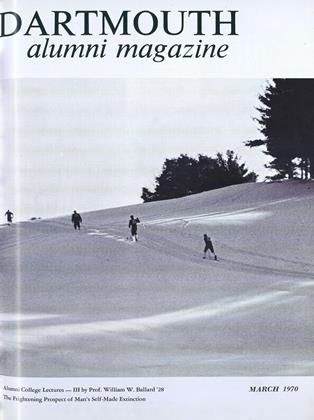Edited by Edward Connery Lathem '51.New York: Holt, Rinehart and Winston,1969. 607 pp. $10.95.
Some editions are more complete than others; the last printings of The CompletePoems of Robert Frost, published after his death in 1963, were in fact incomplete, a paradox which would have appealed to the pawky humor of the man who wrote
Forgive, O Lord, my little jokes on Thee And I'll forgive Thy great big one on me.
His last book, In the Clearing, published in 1962, was not included in the CompletePoems; it is, however, in this book, which may be said to be the "most" complete edition of his poetry we are likely to see for some time. The publisher's note states that, though the time will come for a variorum or definitive edition, the current need is for a volume both for general readers and scholars.
As in the Complete Poems, the poems are printed in the order in which the separate volumes came out, followed by the two Masques. At first glance the notes by Mr. Lathem, the Librarian of Dartmouth College, might appear to be of interest mainly to scholars, bibliophiles, and bibliographers. But one example alone shows that a first glance is not enough. In the notes to ABoy's Will Mr. Lathem has reprinted the original gloss for each of the poems in that volume (Frost omitted glosses for "Going for Water" and "Reluctance"). Though ABoy's Will was published in 1913 when Frost was thirty-eight, many of the poems, of course, were written in his twenties. I was struck, therefore, by the references in the glosses to the emotions of youth, loneliness, longing, scorn, and especially love, an emotion to which the references in the poems of his later years are subtler, more oblique. The glosses on the poems in Part II are also significant: the references not only to love, but to fellowship, death, art, science presage the intimate concerns of a long lifetime.
It is not hyperbole to say that the book is a labor of love: on the part of Frost's publisher; on the part of his young friend who did the notes with scrupulous care; and on the part of his near-contemporary, Rudolph Ruzicka, who has designed a book of great distinction.
Mr. Morse, Professor of English Emeritus at Dartmouth, was a close friend of Frost's.
 View Full Issue
View Full Issue
More From This Issue
-
 Feature
FeatureThe Rise and Fall of Humanity
March 1970 By WILLIAM W. BALLARD '28, -
 Feature
FeatureTHE DICKEY ADMINISTRATION ENDS BUT NOT ITS PERVADING IMPRINT
March 1970 -
 Feature
FeatureDartmouth's Priorities for 1970
March 1970 -
 Article
ArticleThree Students Argue for Coeducation
March 1970 By CHERYL CAREY, Coed, RANDY PHERSON '71, RICHARD ZUCKERMAN '72 -
 Article
ArticleThe Undergraduate Chair
March 1970 By WINTHROP A. ROCKWELL '7O -
 Article
ArticleAn Antidote to Hugeness
March 1970 By CARLOS H. BAKER '32
Books
-
 Books
BooksTHE CROSS-COUNTRY SKI BOOK.
FEBRUARY 1965 By CHARLES E. BREED '51 -
 Books
BooksTHE MOST AMAZING BUT TRUE.
JUNE 1966 By JOHN HURD '21 -
 Books
BooksThe Development of The American Short Story
December, 1923 By K.A.R. -
 Books
BooksTHE AMERICAN INDIAN: A RISING ETHNIC FORCE.
May 1974 By MICHAEL A. DORRIS -
 Books
BooksNotes on lost causes and an enlistment against Nature, as brave as it was brief.
March 1979 By R. H. R. -
 Books
BooksA Tortured Process
MAY 1983 By William N. Fenton '30

